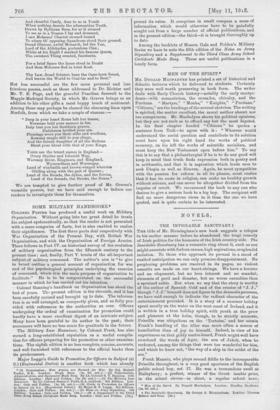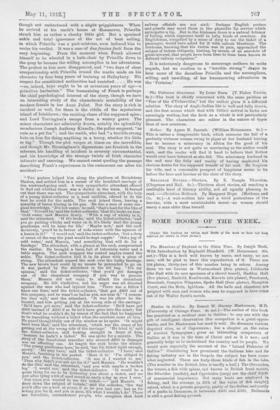NOVELS.
THE INVIOLABLE SANCTUARY.t
THE title of Mr. Birmingham's new book suggests a relapse to his earlier manner before he abandoned the tragi comedy of Irish politics for the humours of the Irish country-side. The Inviolable Sanctuary has a romantic ring about it, such as one might associate with forlorn causes, high aspirations, or splendid isolation. To those who approach its perusal in a mood of exalted anticipation we can only promise disappointment. No perplexing problems are resolved in its pages, no violent assaults are made on our heart-strings. We have a heroine and an elopement, but no love interest and no scandal; elements of peril and disaster, but no worse casualties than a sprained ankle. But when we say that the story is worthy of the author of Spanish Gold and of the creator of " J. J.," though " J. J." himself does not figure in the dramatis personae, we have said enough to indicate the radiant character of the entertainment provided. It is a story of a summer holiday spent mostly on the water on the west coast of Ireland, and it is written in a true holiday spirit, with youth at the prow and pleasure at the helm, though, to be strictly accurate, Priscilla was ubiquitous on the ' Tortoise,' and her cousin Frank's handling of the tiller was more often a source of humiliation than of joy to himself. Indeed, in view of his experiences on that giddy centre-board, Frank might well have re-echoed the words of Agur, the son of Jakob, when he reckoned, among the things that were too wonderful for him, and which he knew not, "the way of a ship in the midst of the sea."
Frank Mannix, who plays second fiddle to the incomparable Priscilla throughout, is a very good specimen of the English public school boy, aet. 17. He was a tremendous swell at Haileybury; a prefect, winner of the Greek iambic prize, in the school eleven—in short, a regular school hero; • Men of the Spirit. By Dugald Madadyon. London : Headley Brother,. [2e. ed. not. J t The Inviolable Sanctuary. By George A. Birmingham, London: Thomas Nelson and Sous. 128.] though not nntinctnred with a• slight. priggishness. When he arrived at his uncle's house at Hosnacree, Priscilla struck him as rather a cheeky little girl. But a sprained ankle and total ignorance of the art of boat sailing, in which Priscilla was a past-mistress, soon induced him to revise his verdict. It was a case of dux fentina facti from the very beginning. From the moment when Frank allowed himself to be wheeled in a bath-chair by Priscilla down to the quay he became the willing accomplice in her adventures. The prefect in him soon disappeared, and "two days of close companionship with Priscilla erased the marks made on his character by four long years of training at Haileybury. His respect for constituted authorities had vanished. . . . He was —as, indeed, boys ought to be at seventeen years of age—a primitive barbarian." The humanizing of Frank is perhaps the chief psychological interest of the story, though we have an interesting study of the chameleonin mutability of the modern female in her Aunt Juliet. But the story is rich in incident as well, for there is the riddle of the mysterious island of Inishbawn ; the exciting chase of the supposed spies ; and Lord Torrington's escape from a watery grave. The minor characters are admirably drawn, notably the splendidly mendacious Joseph Anthony Kinsella ; the police sergeant, "as cute as a pet fox "; and the smith, who had" a terrible strong hate on him for doing anything in a hurry, whether it's little or big." Though the plot verges at times on the incredible, and though Mr. Birmingham's digressions are freakish in the extreme, his handling of incident is severely circumstantial, and his knowledge of the strange twists of Irish character intimate and unerring. We cannot resist quoting the passage describing Frank's experiences in the restaurant car after his
accident :—
" Two porters helped him along the platform at Broadstone Station, and settled him in a corner of the breakfast carriage of the westward-going mail. A very sympathetic attendant offered to find out whether there was, a doctor in the train. It turned out that there was not. The sympathetic attendant, with the help of a young ticket-collector in a neat unifdrin, offered to do the best he could for the ankle. The cook joined them, leaving a quantity of bacon hissing in his pan. He was a man of some sur- gical knowledge. ' It's hot water,' he said, 'that's boat for the like of that." It could be,' said the ticket-collector, 'that it's broke on him.' 'Cold water,' said Mannix firmly. ' With a sup of whisky in it,' said the attendant. If it's broke,' said tho ticket-collector, 'and you go putting whisky and water on it, it's likely that the young gentleman will be lame for life." Maybe now,' said the cook derisively, 'you'd be in favour of soda-water with the squeeze of a lembn in it ? "I would not,' said the ticket-collector, but a drop of sweet oil the way the joint would be kept supple.' Get a jug of cold water,' said Mannix, 'and something that will do for a bandage.' The attendant, with a glance at the cook, compromised the matter. He brought a basin full of lukeWarin water and a table napkin. The cook wrapped the 'soaked napkin round the ankle. The ticket-collector tied it in its place with a piece of string. The attendant coaxed the sock over the bulky bandage. The new brown boot could by no Moans bo persuaded to go on. It Was packed by the attendant in the kit bag. It's my opinion,' said the ticket-collector, • that you'd got damages out of the steamboat company if you was to process them.' Mannix did not want , to attack the steamboat company. He felt vindictive, but his anger was all directed against the man who had injured him. ' There was a fellow I knew one time,' said the ticket-collector, 'that got £200 out of this company, and ho wasn't as bad as you, nor near it." I remem- ber that well,' said the attendant. It was his elbow ho dis- located, and him getting out at the wrong side of the carriage.'
• He'd have got more,' said the ticket-collector He'd have got £500 instead of £200 if so be he'd have gone into the court; but that's what ho couldn't do, by reason of the fact that ho happened to be travelling, without a ticket when the accident came on him,' Ho gazed thoughtfully out of the window as he spoke. 'It might have been that,' said the attendant, which was the cause of his getting out at the wrong side of the carriage,' He tried it,' said the ticket-collector, still looking straight in ' front of him, • because he hadn't a ticket.' No one spoke for a minute. The story of the fraudulent traveller who secured £200 in damages was an affecting ono. At length the cook broke the silence.
• The young gentleman here,' he said, 'has his ticket right enough, surely. 'Ho may have' said the ticket-collector. I have,' said Mannix, fumbling in his pocket. ' Hero it is.' I'm obliged to you,' said the ticket-collector. It was it I wanted to see.' 'nen why didn't you ask me for it ?' said Mannix. Ho wouldn't do the like,' said the attendant, 'and you with maybe a broken leg." I would not,' said the ticket-collector. ' It would ho a queer thing for mo to be bothering you about a ticket, and me just after tying a bit of cord round as nasty a leg as ever I seen.' lint when you wanted to see the ticket----' said Mannix. I drew down the subject of tickets; said the collector, 'the way you'd offer me a look at yours, if so be you had one; but as for asking you for it, and you in pain, it's what I wouldn't do.' There are travellers, cantankerous people, who complain that Irish railway officials are not civil. Perhaps English porters and guards may excel them in the plaueiblo lip service which anticipates a tip. .But in the Irishman there is a natural delicacy of feeling, which expressos itself in lofty kinds of courtesy. An Englishman, compelled by a sense of duty to see the ticket of a passenger, would have asked for it with callous bluntness. Tho Irishman, knowing that his victim was in pain, approached the subject of tickets obliquely, hinting, by moans of an anecdote of groat interest, that people have from time to time been known to defraud railway companies."
It is notoriously dangerous to encourage authors to write sequels, but we confess to a "terrible strong" desire to hear more of the dauntless Priscilla and the accomplices, willing and unwilling, of her buccaneering adventures in the Tortoise.'











































 Previous page
Previous page